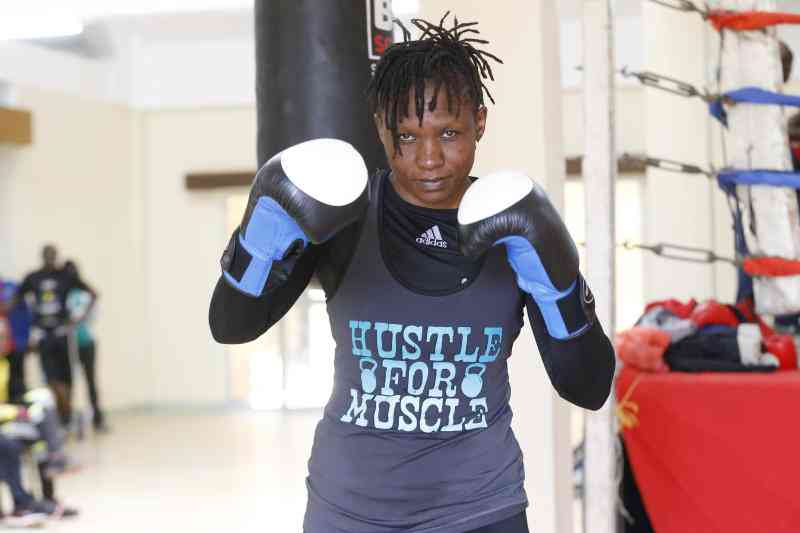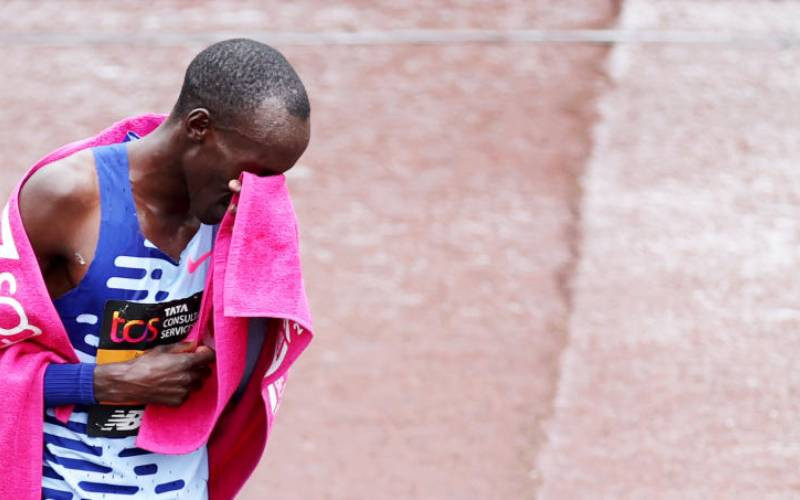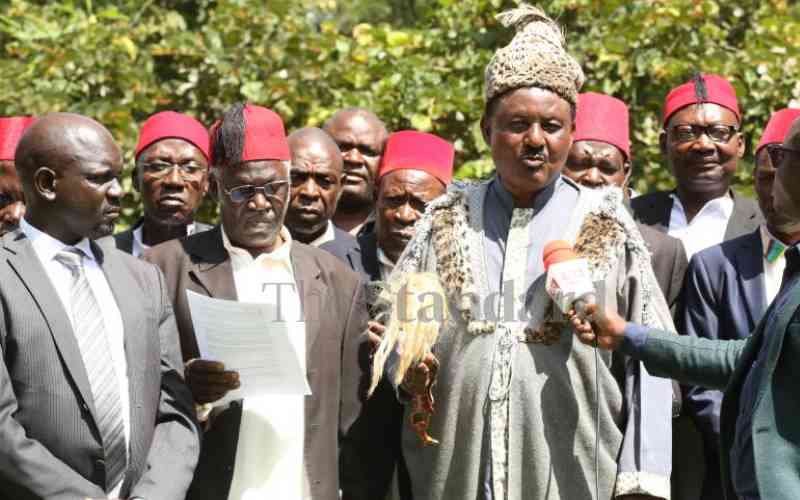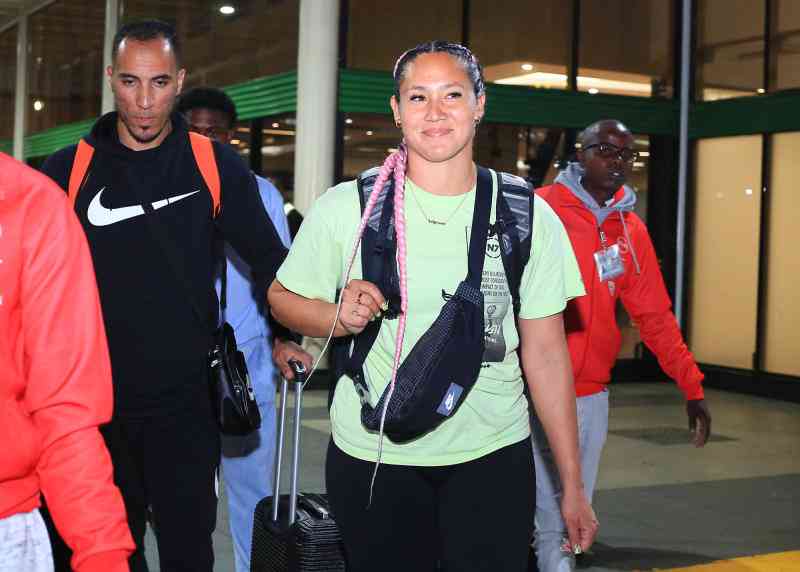 |
|
Samuel Kamau Wanjiru winning the 2008 Olympic Games marathon title inside the Bird’s Nest in Beijing. [PICTURES: FILE/REUTERS, STANDARD] |
By Omulo Okoth
It will be two years on May 15 since the athletics world and Kenya lost one of its most prodigious runners.
Samuel Kamau Wanjiru, who had won Kenya’s first ever Olympics marathon gold in Beijing in 2008, died in his Nyahururu home under circumstances that have since not been resolved.
Wanjiru was reported to have jumped from the balcony of his palatial mansion in the leafy suburbs of Nyahururu. Police first said it was suicide, and then changed the version to say he had jumped to stop his wife from leaving the house after she stumbled upon him with another woman inside the house.
Then Police Commissioner, Mathew Iteere, waded into the controversy to bolster the suicide theory.
But then OCPD Nyahururu, Jasper Ombati gave a different version.
“Wanjiru came home with another woman friend at around 11.30pm, and then when his wife came home and found them, and enquired who she was,” said Ombati.
They got into an argument. His wife locked them in the bedroom and ran off, he added.
“He then jumped from the bedroom balcony. He is not here to tell us what he was thinking when he jumped. We do not suspect foul play. In our estimation, we think he wanted to stop his wife from leaving the compound,” he said.
The second woman
Closed circuit TV cameras captured images of Wanjiru driving inside the compound sometime near midnight, but the gadget apparently malfunctioned and subsequent images were not found to unravel the mystery of the second woman inside the house and events that followed.
The secrets of Wanjiru’s last moments, after he drove from his training base in Eldoret, through Nakuru and Nyahururu where he visited his usual binging joints before heading to his Muthaiga home, were interred with him days later.
The circumstances were so sad and left a foul taste in the mouths of people who appreciated his talent.
The subsequent legal battle mounted by his mother, Hannah, against his widow Triza Njeri did not help matters. It became too murky an affair for the comprehension of people of goodwill.
The melodrama, which was a sad anti-climax of a brief but rich athletics career, were only compounded by the emergence of two other women, who claimed to have been married to him. Wanjiru led a hedonistic lifestyle that was exacerbated by the tonnes of money he won in road races abroad.
Stay informed. Subscribe to our newsletter
A carefree man who believed nothing could stand in his way, he spread fear and affection in equal measure in Nyahururu and its environs. By the time he died, he had a pending court case after being charged with possessing a gun without a license and also threatening his wife and an employee.
In one of his drunken episodes, he drove his SUV vehicle inside a market and sent women scampering for safety as he crushed their wares, tomatoes, chillies, onions and vegetables.
But he made good for the damage, compensating them for more than the damage he caused.
He was generous to a fault, especially in bars, where he would buy any drink to whoever recognised his status. Many took advantage of this weakness to fleece him.
Wanjiru had made an early start to his career. Only four years after discovering that he could run, when he sojourned with Stephen Ndungu’s family in Nyeri, training under the auspices of the Mt Kenya Talents Development Centre, he moved to Japan at the age of 15 to attend school in Sendai where he won some major cross country competitions while also competing in track events.
He was recruited by Rosa Associati of Dr Gabriel Rosa, whose stable has honed the talent of some of the world’s finest marathon runners.
Dr Rosa relocated Wanjiru to Europe to advance his fledgling career. He did not disappoint.
He won the Rotterdam Half Marathon in 2005 in a world record time. He twice improved on that record before graduating to the full marathon in 2007 in Japan where he won the Fukuoka Marathon.
In 2008, he finished second (to Martin Lel) in the London Marathon and sealed his glittering career with the biggest prize in his eventful running life, an Olympic gold in Beijing.
His death shocked the world.“Sammy Wanjiru was an accomplished runner who will be remembered for winning the first Olympic gold medal for Kenya in the marathon and setting a new Olympic record in the process,” the International Olympic Committee said in a statement to eulogise him.
His death was a rude awakening to the prodigious athletes, who flourish too early in their careers and are unable to manage the celebrity status that comes with their achievement.
Jos Hermes, a Dutch athletes’ manager, who also handles many top-notch runners, said Wanjiru saw too much success too early in his career.
“An Olympic champion at 21, he was poised to become the world-record holder in the marathon. He could not deal with all the luxury. It all went too fast, too much money,” Hermes, whose stable boasts Ethiopia’s legend Haile Gebrselassie, said in his eulogy.
“You could not say anything bad about him. He just could not deal with it at all. He was a lion of a man, and he departed in much the same way,”
In his book on Wanjiru, Running on Empty, Dutch journalist Frits Conijn, narrated how Wanjiru was in 2008 paid $300,000 (Sh24 million) in cash and carried all of it in a plastic bag. That was the prize money in the Zayed International Half Marathon, sponsored by Sheikh Mansour bin Zayed Al Hahyan of the United Arab Emirates.
As Olympic champion, his appearance fees in every major competition he was invited to, fetched $200,000 (Sh16 million). In two years, Conijn wrote, his takings from two marathon majors were $1 million (Sh80 million), while conservative estimates put the amount of money he received between 2007 and 2010 at $6 million (Sh500 million).
 The Standard Group Plc is a
multi-media organization with investments in media platforms spanning newspaper
print operations, television, radio broadcasting, digital and online services. The
Standard Group is recognized as a leading multi-media house in Kenya with a key
influence in matters of national and international interest.
The Standard Group Plc is a
multi-media organization with investments in media platforms spanning newspaper
print operations, television, radio broadcasting, digital and online services. The
Standard Group is recognized as a leading multi-media house in Kenya with a key
influence in matters of national and international interest.
 The Standard Group Plc is a
multi-media organization with investments in media platforms spanning newspaper
print operations, television, radio broadcasting, digital and online services. The
Standard Group is recognized as a leading multi-media house in Kenya with a key
influence in matters of national and international interest.
The Standard Group Plc is a
multi-media organization with investments in media platforms spanning newspaper
print operations, television, radio broadcasting, digital and online services. The
Standard Group is recognized as a leading multi-media house in Kenya with a key
influence in matters of national and international interest.










